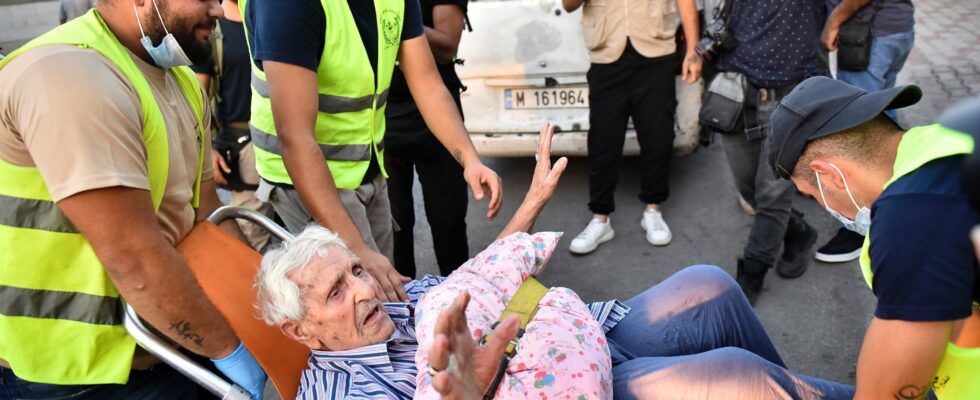The Israeli army announced on Tuesday, September 24, new strikes targeting infrastructure and weapons of the Islamist movement Hezbollah in Lebanon. The day before, after a day of large-scale bombings, Israel had indicated that it had hit around 1,600 targets. These bombings left more than 550 dead, while tens of thousands of people were forced to leave their homes, according to a spokesperson for the UN refugee agency (UNHCR), Matthew Saltmarsh.
The international press is concerned about this “deadly escalation”, as described by the Belgian daily The Freewhich raises fears of a conflagration in the region almost a year after the start of the war in Gaza. “The question no longer arises […] “This is no longer an escalation, nor a low-intensity conflict, it is war,” exclaims the Lebanese daily. The Orient-The Day in Beirut. “A multidimensional war that is not yet total – neither in its scope nor in the scale of the means employed, starting with the sending of ground troops – but which could quickly become so,” fears this media, for whom “the nightmare is becoming reality.”
“Lebanon in the dark tunnel”, notes for his part Annahar. As spotted by France 24this Arabic-language Lebanese daily describes it as “a bloody and destructive day”. On the Israeli side, for the daily life The Jerusalem Postthe Israeli “response” is “not only justified, but long overdue,” and Israelis must “all prepare for what lies ahead, (because) it is not just a matter of hitting back or a small escalation, but a major escalation that could pose real challenges to Israel.”
“Deep sadness” and “great shame”
THE left-wing daily Haaretz expresses its “deep sadness” and “great shame” at the way in which the Hebrew State has just taken “a giant step towards state terrorism”. Israel “has imposed terror and suffering on an entire population, using violent and unbridled means; this is how it acted in Gaza, in the occupied West Bank, and is now acting in Lebanon”, deplores Haaretz. “We hit Hezbollah, it hit back: Israel must now seek a diplomatic solution in Lebanon. Israel cannot repeat the mistake it made by dragging out the second Lebanon war twenty years ago,” the Israeli newspaper said.
The Guardian recalls the long history of the conflict between the Lebanese Shiite militia created in 1982 and Israel. “There have been victories and defeats on both sides over the decades, but the balance appears to have tipped decisively in Israel’s favour in recent months,” writes the British daily. “Israeli officials have described attempts by Iranian agents – or Hezbollah – to carry out assassinations in Israel. None have come close to success,” notes the British media outlet.
David Ignatius, one of the great columnists of Washington Postfor his part, shares his “sadness and fear” about the situation in the Middle East. The journalist and writer, who covered the Israeli invasion as a reporter in Beirut in 1982, draws a parallel between the two periods. “The problem, then as now, was excess. Israel wanted to go all the way, to crush its main adversary, the Palestine Liberation Organization (PLO). No more half-measures, it was necessary to use all the weapons in the arsenal,” relates David Ignatius.
“Then, as now, Israel enjoyed stunning military and intelligence dominance. Its troops reached the suburbs of Beirut within days. But what happened next? Israel’s overwhelming strength masked a strategic weakness: its leaders had no satisfactory answer to the question ‘how will this end?'” According to this columnist, “the only thing that seems clear is that total victory is an illusion in this conflict.”
“Bloodshed”
In another article, The Washington Post recalls that US President Joe Biden traveled to New York on Monday to prepare for what “will likely be his last major speech” to the United Nations General Assembly on Tuesday, “as he seeks to cement his foreign policy legacy” amid the growing threat of war between Israel and Hezbollah. “Joe Biden’s Middle East strategy hinges on securing a ceasefire between Israel and Hamas in Gaza, an agreement that senior US officials acknowledge is increasingly elusive,” the American daily explains.
“The hope was that a ceasefire would pave the way for a diplomatic agreement between Israel and Hezbollah on Israel’s northern border. But the Israeli operations, coupled with suggestions from senior Israeli officials that the focus could shift to Lebanon, appear to be undermining months-long US efforts to end the bloodshed in the region,” the outlet continued.
